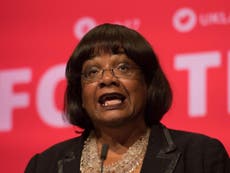Instead of acknowledging racial bias, the BBC is gaslighting Diane Abbott – it’s shameful and dangerous
Abbott is perpetually hounded by hatred. She doesn’t have to find racism where there is none. The statistics show, to a terrifying degree, that racism finds her

Diane Abbott has accused the BBC of legitimising the “mistreatment, bias and abuse” that she faces “as a black woman in public life,” after her appearance on Question Time on Thursday.
A spokesperson for Abbott has said: “It was clear that a hostile atmosphere was whipped up, propped up by reports of inappropriate and sexist commentary in the audience warm-up session.”
Several people have alleged that, during the warm-up to the BBC show, there was some humour at Abbott’s expense from BBC staff members, and that loud jeers could be heard from the audience.
The episode was certainly uncomfortable to watch. As Fiona Bruce tells Abbott that she was “definitely” wrong about her statement that Labour are “kind of level-pegging” in the polls, the audience laugh jubilantly, no doubt remembering the moment where Abbott’s statistical blunder went viral.
Momentum has now released a video claiming that Abbott’s statement was actually correct, according to Britain Elects Poll Tracker. In reaction to this revelation, some people have argued that Bruce’s categorical support for Isabel Oakeshott during the exchange – the woman who informed Abbott that her party was “six points behind” – should not go unchecked. There is, after all, an irony in the fact that one bad interview from 2017 has left a permanent blemish on Abbott’s reputation, while her white and male counterparts rarely receive the same levels of criticism for spouting misinformation.
Abbott’s staff have suggested that the animosity towards the shadow home secretary was fostered before the show. They say that the warm-up had “set the whole audience up to be quite negative” about Abbott.
The BBC’s response to these allegations has been predictable and disappointing. They say: “We are sorry to hear Diane Abbott’s concerns over last night’s edition of Question Time and we have contacted her team today to reassure them that reports circulating on social media are inaccurate and misleading. Diane is a regular and important contributor to the programme … we firmly reject claims that any of the panel was treated unfairly either before or during the recording.”
The implication is that Abbott and her team have got the wrong end of the stick. In refusing to accept Abbott’s claims, the BBC is essentially implying that the seasoned politician is crying victimhood without being in full possession of the facts.
This idea that Abbott would claim foul play where there is none is ignorant, insensitive, and extremely dangerous. After all, this is the woman who, in the six-week run-up to the last election, received 45 per cent of all abusive tweets sent to female MPs. Abbott has, in the past, revealed that she gets hundreds of racist letters every day – some of which are covered in swastikas and pictures of monkeys or chimpanzees. Diane Abbott is perpetually hounded by hatred. She doesn’t have to find racism where there is none. The statistics show, to a terrifying degree, that racism finds her.
If a black woman tells us she found an environment uncomfortable, we need to listen to her concerns, believe her, and see what we can change. This process becomes still more important when we’re dealing with a space that is actively designed to be unbiased. BBC Question Time prides itself on being an equal playing field; they should be seriously sobered by Abbott’s feedback.
Instead, they’ve taken a different tack; they’ve chosen to weaponise the public conception of Abbott as “ill-informed”, and are peddling the widespread and deeply problematic narrative that people of colour, and black people in particular, are paranoid and angry without cause.
The trouble is, this approach is an incredibly common way of dealing with accusations of prejudice. It’s essentially gaslighting: the process of psychologically manipulating someone, such that they doubt their own sanity. By telling Abbott that she has in fact been mislead by erroneous social media reports, the BBC are actively undermining Abbott’s own experience of events. People of colour will be familiar with this insidious technique being used to undermine their legitimate concerns.
Diane Abbott has shown super-human resilience throughout her political career. The fact that we might still refuse to concede what is palpably obvious – that her race and gender negatively affect her experience – is a damning indictment.
We need to be elevating, not undermining, the voices of the victims of racism. People choose to fuel this conception of Abbott as incompetent, whiney or untrustworthy not because it’s true, but because we don’t want to face what she has to say. Luckily, despite all the vitriol that’s thrown at her, Diane Abbott refuses to be silenced.



Join our commenting forum
Join thought-provoking conversations, follow other Independent readers and see their replies